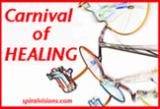
I am delighted to be hosting week 40 of the
The Carnival of Healing. I've submitted links to various carnivals, and thought it was time for me to throw my hat in as a host.
The
Carnival of Healing is a weekly blog made up of collective sites and blogs on the topics of holistic health, wellness, spirituality and self empowerment. This week's theme is "Healing the Psyche".
I find that the best way for me to tend to my psyche is through my senses. Sight, Sound, Smell, Touch and Taste refuel me in wonderful ways. I revive myself with viewing nature, and when I can't get outside, looking at beautiful
photographs and
art always soothes me. Soundscape music or soft jazz can often be heard in the background in my home or office, filling the space with lush sounds. Fresh flowers or scented oils fill the air, and I surround myself with textures that feel so wonderful to touch and taste. Nothing like a velvet blanket and a cup of tea, I tell you. So for me, filling my senses replenishes my psyche.
Here are some other ways bloggers from the carnival tend to their psyche:
 Balance
Balance
Pam Slims over at
Escape From Cubicle Nation blogs about the book by Chris Pearson, "How to Kiss Corporate Life Goodbye" and writes
herean open letter to corporate America. The balance that can come from finding satisfaction with career and personal needs is invaluable. I couldn't agree more.
 Nourishment Bread and Money
Nourishment Bread and Money highlight the importance of good health and nutrition, and that the best way for parents to instill good overall health habits is for to be the example for their children. I couldn't agree more.
Kenneth Lim over at
Fun PC Games details his juicing experience, and finds that the process , though at first he questioned, was a positive one in the end for him. And
Natural Remedies touts the medical and curative benefits of bananas. I thought they were just nutritious, but wow, the things they can do are amazing!
 Spirituality
Spirituality
Batya from
Blog Free , has found meaningful healing from Hannah's prayer. And
Christine Kane agrees that prayer is powerful, and talks about how she overcame bulimia with an honest and open account of her experience. Kenneth Lim chimes in and reminds us that finding a sense of peace can come from
Dwelling in the Kingdom Of God . And over at
Frugal Wisdom, Wenchypoo poses the issue of frugality as secular religion.
 Risking
Risking
Amit over at
The Power of Choice, believes that embracing creativity is key. He says, "Everytime an idea pops into your head, utter to yourself: "What a great idea!!"
Christine Kane echoes this as well, suggesting that we need to be bold and hear the inner voice within us in her post, "Who Do You Think You Are?"
Next Weeks' Carnival is May 13 , 2006, and will be hosted by
Crossroads Dispatches. If you would like to submit a post for consideration in an upcoming edition, please visit the
Carnival of Healing home page.To visit last week's carnival, link to
Spiral Visions











